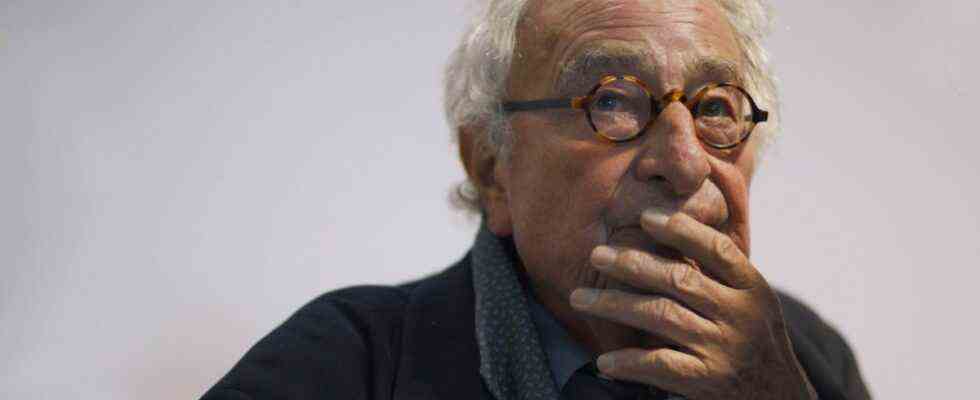It was irresponsible to broadcast something like this, it sounded like a scandal, but something like this actually happened once on German television, at 9:15 p.m., the second-best time to broadcast. Karl Jaspers is asked about the first grand coalition, which came to power five weeks earlier, on December 1, 1966, and his verdict is devastating. The 83-year-old philosopher sits in an armchair in front of a wall of books, takes a breath and stutters in the best Oldenburg dialect: “At the top is an old National Socialist. That’s a novelty. I think it’s an affront to foreign countries and an insult to the minority of Germans, say a million people, who always hated and still hate Nazism.” Jaspers spoke of Kurt Georg Kiesinger, former NSDAP, now CDU and new Federal Chancellor.
With his glasses, Merseburger was identified as an intellectual, but by no means unworldly
Peter Merseburger, himself a supporter of this grand coalition and anything but a radical, seemed surprised by the vehemence with which his interviewee Jaspers dispatched the new government. “We hesitated at first,” he carefully moderated the now legendary outburst, “to show you this testimony of bitter absoluteness. But Germany has become poor in spiritual authorities.” Merseburger was the newcomer to NDR, he was in charge of panorama taken over, the most controversial broadcast, which the ARD afforded. He was initially considered more docile than his predecessor Joachim Fest, who had to go under pressure from the CDU, and against his dismissal in Hamburg Ulrike Meinhof, Stefan Aust, Heinrich Breloer and Peter Rühmkorf took to the streets. Of course it turned out differently. Balance was not to be expected from a magazine that saw scandal as a matter of honour. With his glasses, Merseburger was identified as an intellectual, but therefore neither unworldly nor apolitical. A CDU deputy even lamented in the Bundestag that “we are finally tired of the intellectual talk of a Mr. Merseburger”. The new government, especially the following social-liberal coalition, tried a new Ostpolitik, the student riots, the wildcat strikes, the irregulars around the former panorama-Employee Meinhof, who formed the RAF – panorama stayed reliably enlightening, and the Springer newspapers just as reliably demanded Merseburger’s dismissal or at least screen abstinence during election campaigns. There wasn’t much nicer shitstorming than today. Hans Leyendecker reportedthat Merseburger had a sent in jumping jack with his facial features hanging behind his desk, decorated with the terms of endearment “comrade, stinker, traitor”.
It all started so well: in 1947 the student Merseburger was jailed for two weeks in the then Soviet-occupied zone for pasting posters for the Eastern CDU. He soon went to the west, studied German and philosophy and came to 1960 Mirror, but where he did not sink. panorama and television would have made it easy for him to pursue a quasi-civil service career, especially since he had also been editor-in-chief of the NDR since 1968. But in 1975 he gave up his broadcast and went on to become a correspondent, reporting reliably fiercely and still intellectually from Berlin, London and Washington.
At 63 he retired from television to write. It turned out – rather unusual for a television worker – that he could actually do it. In the most dignified prose he wrote carefully researched and equally carefully balanced biographies of the political authorities Kurt Schumacher, Rudolf Augstein and, especially highly praised, Willy Brandt. (How good it would have been for historiography if Merseburger had written the Franz Josef Strauss biography instead of the assiduous Horst Möller!) The bonhomie of the subject rubbed off a bit on Theodor Heuss (subtitle “The Citizen as President”) . But where else would you find out such a nice detail as Heussen’s lucrative defense of the German armaments industry. The former Federal President was invited to Essen in 1961 in order to “decontaminate” Krupp’s bad reputation with reference to foreign warsmiths with a speech. For this, “Alfried Krupp von Bohlen und Halbach is just as grateful as he is appreciative,” as the biographer puts it incomparably casually, he “assigns a six-figure sum as a fee”. After Mirror, after television, Merseburger managed a second life, and he thus became a chronicler of the early Federal Republic.
Peter Merseburger, one of the rare authorities in German journalism, died in Berlin on Tuesday at the age of 93.

